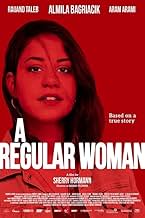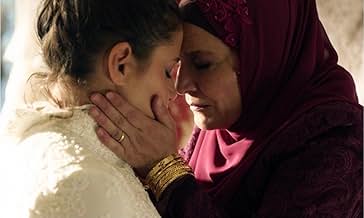IMDb रेटिंग
7.6/10
2.7 हज़ार
आपकी रेटिंग
अपनी भाषा में प्लॉट जोड़ेंAynur, a German woman of Kurdish-Turkish descent, struggles for a free, self-determined life in the face of her family's opposition. Her brothers insult and threaten her until she finally re... सभी पढ़ेंAynur, a German woman of Kurdish-Turkish descent, struggles for a free, self-determined life in the face of her family's opposition. Her brothers insult and threaten her until she finally reports her oldest brother to the police.Aynur, a German woman of Kurdish-Turkish descent, struggles for a free, self-determined life in the face of her family's opposition. Her brothers insult and threaten her until she finally reports her oldest brother to the police.
- निर्देशक
- लेखक
- स्टार
- पुरस्कार
- 2 जीत और कुल 3 नामांकन
फ़ीचर्ड समीक्षाएं
The film gives a lot of emotions. And its status of real fact reflection gives to its message an universal value. A great film about faith and about life as tool to become yourself. The story is simple and, in essence, familiar. The film gives only facts . And their consequences. And the performance is real inspired . Portrait of a sacrifice as high price of love. The love for family and, in same measure, the love for life. Short, a wisedome lesson.
It could have been great, the first person narrative after the crime compromised the storytelling
The enemies of religion have corrupted Islam so much with lies that a woman's life has become more worthless than a dog in the street, what a pity. There is no justice in so-called Muslim countries. And it never will be. You should definitely watch. An exemplary movie.
"Nur eine frau" is a real womens movie. It was made by a female director (Sherry Hormann), shot by a female cinematographer (Judith Kaufmann) and has a subject (honor killing) with mostly female victims. At the beginning of the film the dead of the lead character is showed using archive material, so there is no real tension in the usual sense of the word. Nevertheless the movie aroused different emotion in me.
The first emotion was disbelief. Daughter Aynur (Almila Bagriacik), just 16 years old, is forced into a marriage by the Surucu family. When the husband turns out to be violent and the, meanwhile pregnant, Aynur flees back to her family she is anything but welcome. Did she do everything her husband ordered her to do? Did she please him enough in bed? No wonder Aynur leaves the house and starts living on her own, That is the moment when the trouble really starts, because she is threatening the honor of the family.
In comparison with the Surucu family the five sisters in "Mustang" (2015, Deniz Gamze Erguven) are nearly living in a liberal family! Is this not a bit overdone? Is this not a caricuture? The answer is in the first place that the story is based on real facts. In the second place it is hard to make a "nuanced" film about such a horrible subject as honor killing. Of course not all Muslim families are like this, but this is shown in the film. The oldest brother is much more enlighted than his younger brothers. Finally, although I don't know the precise statistics, it is clear that the case of Aynur does not stand alone. In this context I would like to call attention to the various possible meanings of the title "Nur eine frau". "Nur" can be translated as "only" and stands for the low status of a woman in the fundamentalist version of the Muslim religion the Surucu family is adhering to. "Eine" can be translated as "one" and is meant to underline that Aynur is just an example is of a much broader problem.
After the disbelief came the curiosity (from the moment that Aynur left home until she was killed).
What was behind the fiercely hatred of the brothers (except the oldest one)? It was obvious that family was more important for them than the individual. But why was the responsibilty to keep the family honor high so unilaterally assigned to women? Was the hatred of the brothers purely religiously motivated or was it also a struggle to hold on to the power that men are in charge just because they are men and not because of their own merits?
Why didn't the women in the family (mother and sisters) support Aynur?
Why didn't Aynur see the danger, although she was warned by her oldest (and enlighted) brother?
This middle part of the movie raised many questions without giving a direct answer. Perhaps it is the most interesting part of the movie.
The end of the film made me very mad.
The way the assassination of Aynur is planned within the family and celebrated when it is done.
If you are convinced that killing your sister is nothing less than your religious duty, just bear the consequences. In stead of this the girlfriend of the murderer is put under pressure to produce a false alibi. She doesn't do this, after which she has to go undercover.
All in all the Surucu family is in my opinion not some disadvantaged family with retarded religious beliefs but operated more like a criminal organisation.
The emotions described above made it very difficult to assess the quality of the film.
The choice of the subject is courageous.
The middle part, raising more questions than giving answers was for me the most interesting.
Rauand Taleb, playing the youngest brother / murderer, did a very good job. He really scared me with the intensity of his hatred.
The first emotion was disbelief. Daughter Aynur (Almila Bagriacik), just 16 years old, is forced into a marriage by the Surucu family. When the husband turns out to be violent and the, meanwhile pregnant, Aynur flees back to her family she is anything but welcome. Did she do everything her husband ordered her to do? Did she please him enough in bed? No wonder Aynur leaves the house and starts living on her own, That is the moment when the trouble really starts, because she is threatening the honor of the family.
In comparison with the Surucu family the five sisters in "Mustang" (2015, Deniz Gamze Erguven) are nearly living in a liberal family! Is this not a bit overdone? Is this not a caricuture? The answer is in the first place that the story is based on real facts. In the second place it is hard to make a "nuanced" film about such a horrible subject as honor killing. Of course not all Muslim families are like this, but this is shown in the film. The oldest brother is much more enlighted than his younger brothers. Finally, although I don't know the precise statistics, it is clear that the case of Aynur does not stand alone. In this context I would like to call attention to the various possible meanings of the title "Nur eine frau". "Nur" can be translated as "only" and stands for the low status of a woman in the fundamentalist version of the Muslim religion the Surucu family is adhering to. "Eine" can be translated as "one" and is meant to underline that Aynur is just an example is of a much broader problem.
After the disbelief came the curiosity (from the moment that Aynur left home until she was killed).
What was behind the fiercely hatred of the brothers (except the oldest one)? It was obvious that family was more important for them than the individual. But why was the responsibilty to keep the family honor high so unilaterally assigned to women? Was the hatred of the brothers purely religiously motivated or was it also a struggle to hold on to the power that men are in charge just because they are men and not because of their own merits?
Why didn't the women in the family (mother and sisters) support Aynur?
Why didn't Aynur see the danger, although she was warned by her oldest (and enlighted) brother?
This middle part of the movie raised many questions without giving a direct answer. Perhaps it is the most interesting part of the movie.
The end of the film made me very mad.
The way the assassination of Aynur is planned within the family and celebrated when it is done.
If you are convinced that killing your sister is nothing less than your religious duty, just bear the consequences. In stead of this the girlfriend of the murderer is put under pressure to produce a false alibi. She doesn't do this, after which she has to go undercover.
All in all the Surucu family is in my opinion not some disadvantaged family with retarded religious beliefs but operated more like a criminal organisation.
The emotions described above made it very difficult to assess the quality of the film.
The choice of the subject is courageous.
The middle part, raising more questions than giving answers was for me the most interesting.
Rauand Taleb, playing the youngest brother / murderer, did a very good job. He really scared me with the intensity of his hatred.
This movie made me so angry!
It is heartbreaking when you see how this woman tries to get into her own life and the patriarchal family destroys everything.
Great acting and cinematography feel like you are part of the story. A must watch.
क्या आपको पता है
- ट्रिवियाBased on the life of Hatun "Aynur" Sürücü, who was murdered in 2005.
टॉप पसंद
रेटिंग देने के लिए साइन-इन करें और वैयक्तिकृत सुझावों के लिए वॉचलिस्ट करें
- How long is A Regular Woman?Alexa द्वारा संचालित
विवरण
- रिलीज़ की तारीख़
- कंट्री ऑफ़ ओरिजिन
- आधिकारिक साइट
- भाषाएं
- इस रूप में भी जाना जाता है
- A Regular Woman
- फ़िल्माने की जगहें
- उत्पादन कंपनियां
- IMDbPro पर और कंपनी क्रेडिट देखें
बॉक्स ऑफ़िस
- दुनिया भर में सकल
- $10,786
- चलने की अवधि1 घंटा 30 मिनट
- रंग
- पक्ष अनुपात
- 1.85 : 1
इस पेज में योगदान दें
किसी बदलाव का सुझाव दें या अनुपलब्ध कॉन्टेंट जोड़ें



![Trailer [OV]](https://m.media-amazon.com/images/M/MV5BYjYxN2U5NjktZjk1YS00MTA3LWEyOWQtNjIzMWY5MWQ2NTAzXkEyXkFqcGdeQXRyYW5zY29kZS13b3JrZmxvdw@@._V1_QL75_UX500_CR0)























